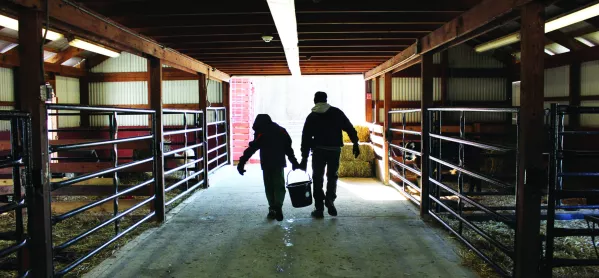- Home
- ‘We need more animals in our schools’
‘We need more animals in our schools’

Visitors from all over the world frequently make their way to Scotland to review our model for providing care and education to children who have experienced trauma or adversity. Last month, we took our turn of reaching out and made our way across the Atlantic to visit Green Chimneys in New York state.
Green Chimneys is an organisation that helps children who have been unsuccessful in traditional education environments and who require a small, structured and supportive setting. There’s nowhere else in the world that brings animals and outdoor play into the curriculum the way Green Chimneys does, and as we get closer towards opening our new Lochwinnoch campus, it’s vital that we learn from those who are experts in the field - literally.
We recently announced plans to open a primary school in Lochwinnoch with residential accommodation for young children who have been affected by adversity in their early years, and we’ve spent the last three years researching ground-breaking methods of exactly how to make this work. Green Chimneys is the latest part of this process.
The school and farm in upstate New York, 50 miles from Manhattan, is home to over 200 animals from sheep and pigs, to camels and snakes, each of which has a different benefit to the type of therapeutic approach and educational benefits it can offer to the children.
Extensive research has found that interaction with animals calms children and allows them to better control their emotions, giving them an outlet to show compassion that they struggle to express with humans.
For example, a rescue dog is relatable to children who have experienced loss, separation and trauma. We can tell children that although the dog might be a bit grumpy and bark a lot, it’s not a bad dog, it has just been treated unfairly, and when we tell the dog what to do it’s just to keep him safe. We’ve found that this translates well to children who have faced their own loss, separation and trauma and we’ve used this method in the past.
While children relate to the animals, there are also important lessons for them to learn which is perhaps a more digestible approach than an adult telling them what to do or how to act.
There’s an element of risk-taking to working with animals such as donkeys or camels which can react in a way that will force children to accept its boundaries, while the reactions of an adult or another child might seem personal, with patience developed as they learn to accept the animal’s capabilities.
When our Lochwinnoch campus opens, it will be a gradual process to increase both the number of children cared for and the variety of animals living on the property. We will look to start off with animals that are easy to maintain such as sheep, goats, cats and dogs, before we investigate expressive animals like donkeys, and then creatures such as snakes which address children’s fears.
There is also a big focus on teaching outdoors and using nature within the curriculum at Green Chimneys, based on research that highlights the benefits this holds for a child’s education, social skills, health and wellbeing - another type of learning that we will develop within our Lochwinnoch campus.
Throughout our visit it was clear that the kids enjoyed being outside with the animals and it made them happy, which in a way makes it worth doing in itself. However, the research we’ve carried out and the visits that we’ve encountered highlight significant benefits to children who have experienced trauma.
As we create an environment that is focused on a positive and safe space for primary-aged children who have struggled to engage with education elsewhere, we will use a model that mixes animal therapy and outdoor experiences, with the current standard of care and education already offered at Kibble, to provide our youngest children with the best possible start in life.
Tracie McEwan is headteacher at Kibble Education and Care Centre’s planned Lochwinnoch campus in rural Renfrewshire, near Glasgow
Keep reading for just £1 per month
You've reached your limit of free articles this month. Subscribe for £1 per month for three months and get:
- Unlimited access to all Tes magazine content
- Exclusive subscriber-only stories
- Award-winning email newsletters